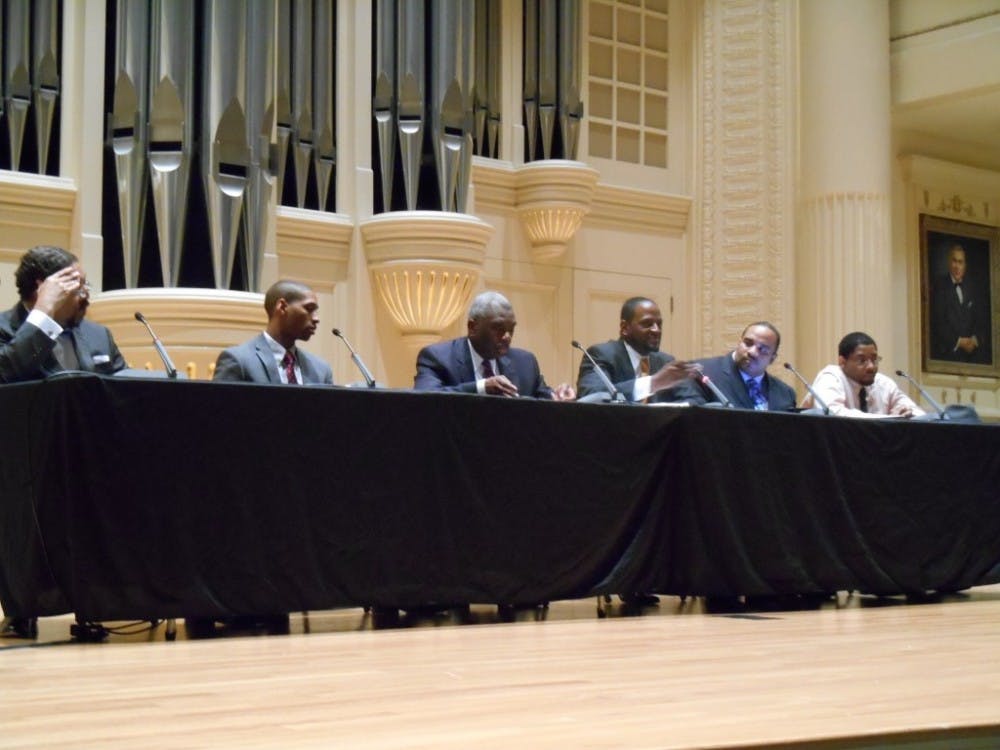Panelists gathered Thursday night in Whitley Auditorium to analyze the current issues facing African-American men and offer their perspectives for the future. During the discussion, Black Men in America - Imagining the Future, the panelists found that many of the problems that confront the social group are ingrained in modern society.
Jean Rohr, director of the Center for Access and Success, assembled the panel of six black men who are experts in different disciplines. During the event, she served as moderator for the topics of medicine, education and law.
The discussion emphasized education as the pathway to medicine and law.
A lack of black males in the education system causes problems, according to panelist Anthony Graham, chair of North Carolina A&T State University’s school of education.
“Fewer than one percent of the teaching force is African-American men,” Graham said. “If our young black men aren’t seeing these professionals, they won’t be that profession.”
According to Rohr, statistics show that serious racial disparities also exist in the field of medicine.
Panel member Gerald Truesdale, a Greensboro, N.C., physician who specializes in plastic and reconstructive surgery, said the number of African-American men who apply to medical school has decreased significantly in recent years. He also said data shows patients of the same race as their physician tend to better relate to their healthcare provider.
Graham said African-American men are often the victims of underlying institutional problems of the nation’s education system. He said that transformation, rather than reformation, is necessary in order to improve the situation.
Truesdale said that a sense of family and community is important for the education of African-American men, citing the support that he received in his upbringing.
Senior Jordan Joshua called for a “continuous presence” of black males as role models.
Although educational disparities exist, Graham said that people often have misperceptions about black males in higher education.
“There are more black males educated in college than there are in jail,” Graham said. “We perpetuate something that’s a myth.”
In regards to incarcerated members of the racial group, panelist Gian Spells, who runs a mentoring program for the Alamance-Burlington School System, said that some poorer African-American men break the law because they feel compelled to fit into America’s “monetary, resource-based society.”
Panelist George Johnson, dean of the Elon University School of Law, said that society must examine the attitudes toward who is prosecuted and arrested for crimes, instead of the laws themselves.
“Nobody sits down with the provision that a law is designed to incarcerate black men,” he said.
Panelist Walter Mack, senior pastor of Union Baptist Church in Winston-Salem, N.C., encouraged students who study law to work towards eliminating prejudice when laws are enacted.
To continue the discussion, Rohr said she planned to conduct a similar event in the future.
“There are many complexities facing black men in America today,” she said. “It seems like for many of them there are so many around, and they have trouble pulling apart from them.”
Rohr said she was inspired to assemble the panel after she conducted research on African-American men and learned that they faced many barriers.
“I think this is a panel that people need to pay more attention to,” said freshman Marshall Brown. “I thoroughly enjoyed it because they gave real solutions as far as helping people.”
Senior Sean Patterson agreed.
“I feel like the panel was really diverse and really versatile in terms of educational experience, professions, and interests,” said he said. “I feel like they brought different perspectives of things that I’ve experienced.”


